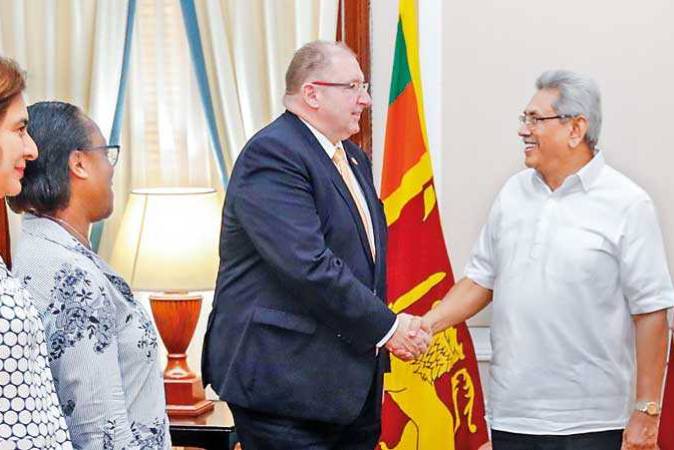The World Bank and Sri Lanka yesterday identified several new areas of development cooperation in addition to World Bank-funded existing projects, including renewable energy, garbage disposal, watershed management, and developing spices for exports, the President’s Media Unit said in a statement.
The two sides had also discussed ways of easing traffic congestion and improving pedestrian and road safety.
This understanding was reached during the discussion that followed when World Bank Vice President – South Asia Hartwig Schafer called on President Gotabaya Rajapaksa at the Presidential Secretariat yesterday. Vice President Schafer said that concessional funding could be made available for projects to be implemented in these areas.
President Rajapaksa, recalling his association with some of the World Bank-funded projects, such as road development and city beautification completed during his tenure as the former Defence Secretary, welcomed further assistance from the Bank.
Referring to development of the plantation sector, the President emphasised the need to focus on minor crops such as pepper and cinnamon. The World Bank Vice President responded “these crops offer enormous opportunity in terms of employment and export income generation”.
“At present, there are 18 ongoing World Bank-funded projects. Some of them are progressing well. Some are not. The World Bank will go ahead with the Kandy Multi-Model Terminal Project aimed at easing traffic congestion,” Schafer observed.
President Rajapaksa, highlighting the importance of using modern technology in such activities, expressed willingness to have further discussions to decide on specific projects.
World Bank Country Director Idah Z. Pswarayi-Riddihough and Secretary to the President Dr. P. B. Jayasundara were also present.
Earlier in the day, the World Bank Vice President met Prime Minister Mahinda Rajapaksa who requested for planned projects to be designed in a way that has “tangible benefits to the people”.
The Prime Minister further stated that infrastructure and rural sector development are key priorities for the new Government while there is also a keen interest in assisting small and medium-sized enterprises (SMEs), his media unit said in a separate statement.
Vice President Schafer agreed that World Bank projects in Sri Lanka should focus on the priorities set out by the new Government.
“It’s great to see how the country is recovering from the tragedy of the Easter attack,” Schafer said. “We have long-standing relations with Sri Lanka. We look forward to supporting the journey.”
Noting that the new Government has “inherited an economy that was under a lot of stress”, the Vice President offered technical assistance in identified sectors.
Both delegations agreed that it is important to ensure that the agreements entered into are aligned with the priorities and policies of the Government. The delegations also discussed a number of ongoing projects and newer potential initiatives in the agriculture, plantation and tourism sectors, and the empowerment of women in rural areas. “I hope we can identify useful priorities that will benefit the people of Sri Lanka,” Schafer said.
(FT)

